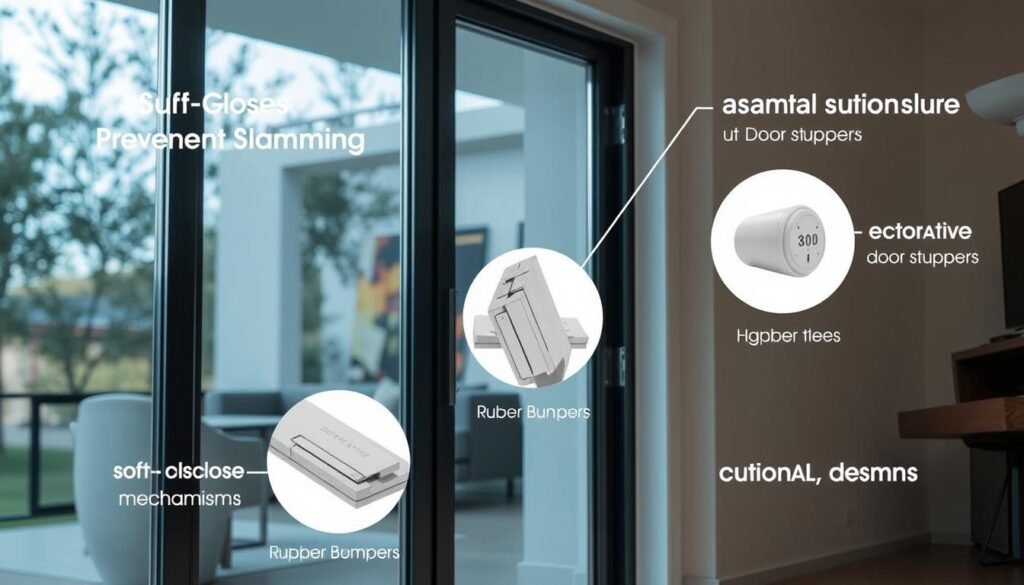Glass door slamming is a common problem in Singapore. This article offers practical solutions to reduce noise and make your home quieter. Knowing why doors slam, like door imbalance or weather, helps prevent it.
We’ll share easy ways to stop doors from slamming. These tips will help keep your home peaceful. Whether you want affordable fixes or ways to make your home safer, we’ve got you covered.
Understanding the Causes of Glass Door Slamming
Before we find ways to stop glass doors from slamming, we need to know why it happens. Doors can slam if they’re not balanced right, if they hang unevenly, or if the hinge pins are loose. These problems often need professional help to fix.
Changes in temperature and weather also play a big role. When it gets cold or hot, the door parts can react in ways that make it slam. If a door was installed wrong, it might not work right, making slamming worse. Knowing what causes glass door slamming is key to fixing it for good.
Statistics show how important it is to fix this issue. Every year, over 300,000 people get hurt from doors in the U.S. Glass doors are common in homes today. Making sure they work well is crucial for safety and comfort.
- Door imbalance
- Uneven hanging
- Loose hinge pins
- Improper installation
- External weather conditions
Door Imbalance and Uneven Hanging
A big reason for door slamming is door imbalance. This happens when the door’s weight is not spread out right or if it’s hung wrong. Uneven hanging makes doors swing harder. To fix this, we need to focus on door alignment.
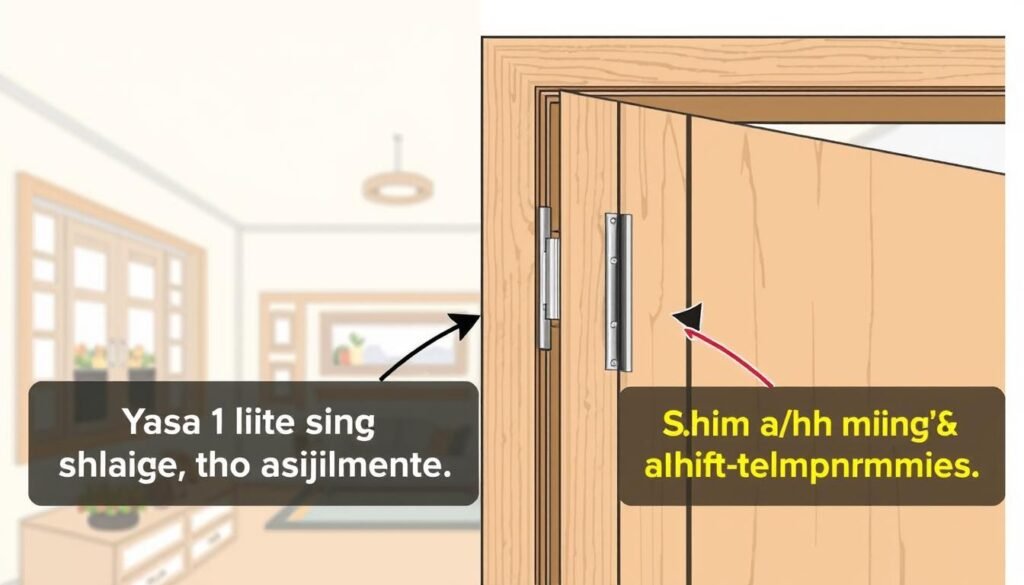
- Check the hinges for tightness. Over time, screws can loosen, which contributes to uneven hanging.
- Consider replacing shorter hinge screws with longer ones, such as 2-inch screws, to create a more secure fit.
- If the latch-side door jamb is not snug, drilling pilot holes and using 2-inch screws can enhance stability.
- Pay attention to the contact position of the latch in relation to the strike plate hole. This can indicate specific misalignment issues.
- If the latch misses the strike plate by more than 1/16-inch, relocating the strike plate might be necessary.
Making the right adjustments can make your door last longer and look better. Keeping an eye on door imbalance and uneven hanging is important for both looks and function in your home.
Loose Hinge Pins and Improper Installation
Loose hinge pins or wrong hinge installation can cause big door installation problems. This leads to doors moving too much and slamming. In Singapore, humidity can make hinges rust and corrode, making problems worse. It’s important for homeowners to watch for fixing door hinges that are wearing out.
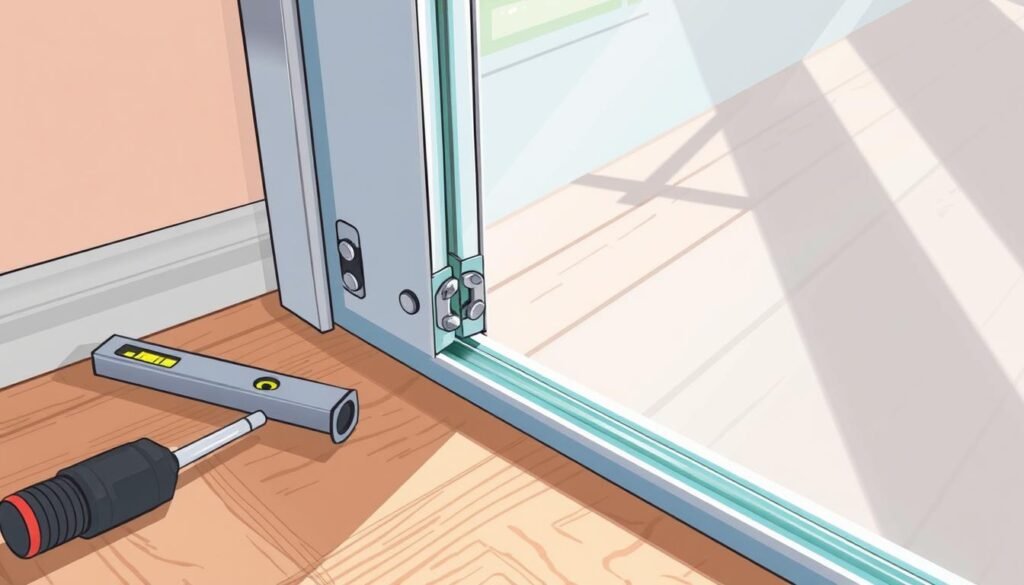
Making sure screws on hinges are tight and installed right can stop doors from slamming. Finding the right balance when adjusting hinges is key, especially in Singapore’s humid weather. Regular maintenance tips include checking for loose hinge pins and keeping hinges clean and free from rust or debris.
The following table summarizes common issues associated with hinge pins:
| Hinge Issue | Potential Effects | Recommended Solutions |
|---|---|---|
| Loose Hinge Pins | Door slamming, misalignment | Tighten screws, replace pins |
| Corrosion/Rust | Reduced durability, squeaking | Apply lubricant, replace hinges |
| Improper Installation | Door sticking, difficulty in operation | Reinstall hinges correctly |
| Wear-Out of Components | Heightened security risks, door malfunction | Regular inspections and replacements |
Knowing about these common issues helps homeowners keep their doors working well. This improves both how well doors function and how safe they are.
Weather Conditions and Air Pressure Changes
Weather greatly affects glass doors, especially when it comes to slamming. High winds, sudden cold, and big air pressure changes can force doors to shut hard. When windows are open, these changes can cause strong drafts that might slam a door shut.
Worn-out or poorly installed door hinges can make things worse. Even a small imbalance can make doors slam when the wind blows. Homeowners should check their hinges often to keep them working right. Making small tweaks can help stop doors from slamming due to air pressure changes.
- Using self-stick felt pads along the doorframe can minimize slamming caused by breezes.
- Foam weather stripping not only muffles sounds but also provides a secure seal for heavier doors.
- Installing a pneumatic door closer prevents slamming by allowing the door to close slowly and smoothly.
- Windy or stormy days often lead to increased door slamming occurrences.
Air pressure changes happen when indoor and outdoor temperatures differ. This can make doors slam more often. To fix these problems, it’s smart to look into different solutions available.
| Solution | Description |
|---|---|
| Felt Pads | Cushions the edges of doors, reducing slamming speed. |
| Foam Weather Stripping | Soundproofs and seals doors against drafts. |
| Pneumatic Door Closer | Controls closing speed to prevent slamming. |
| Door Stops and Bumpers | Physical barriers that prevent doors from fully closing. |
Using these solutions can help fight environmental effects and improve door function. With the right fixes and protections, it’s possible to reduce door slamming.
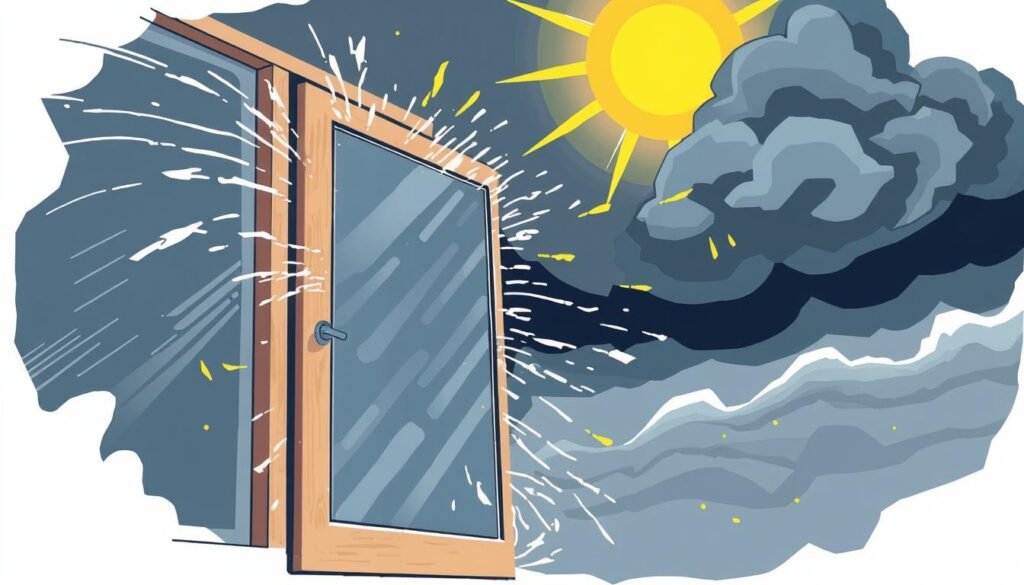
Checking for Warped or Irregular Glass Doors
To stop glass doors from slamming, it’s key to check for warping or irregularities. A detailed door assessment is needed to spot issues that might cause slamming. This includes checking if the glass doors are warped or not shaped right.
This lets you fix the problem so the doors open and close smoothly.
Identifying Warped Panels
Start by looking for warped panels in the glass doors. Signs include visible distortions in the glass or frame. These distortions can cause gaps or misalignments.
Regular checks are important to keep the doors working well. Fixing warpage early can save you money and time in repairs.
Examining Irregular Shapes
Then, check the door’s overall shape. Irregular shapes can lead to poor sealing and drafts, causing slamming. Look for swelling or gaps along the edges during your inspection.
These signs may mean you need to act fast to fix the issue.
Assessing Door Damage
It’s also important to do a full door damage check. Watch for cracks, chips, or other damage in the glass. Any damaged parts should be replaced right away.
This ensures the door works smoothly. Using tools like hydraulic door closers can also help stop slamming and make things safer.

Use what you learn from inspecting glass doors to keep them working right. This helps avoid slamming and makes your space safer and quieter.
The Impact of Airflow and Drafts on Door Slamming
Airflow issues and drafts can make doors slam shut. When windows are open or exhaust fans are on, air pressure changes. These changes can cause sudden gusts of air, making doors slam shut.
Many homeowners struggle to stop doors from slamming. In tall buildings, temperature differences cause big pressure changes. Cold or hot weather makes these issues worse, leading to doors that swing wildly.
To solve these problems, improve your home’s insulation and close unused windows. Designing your home to manage airflow better can help. Also, make sure doors fit well in their frames to keep air pressure balanced.
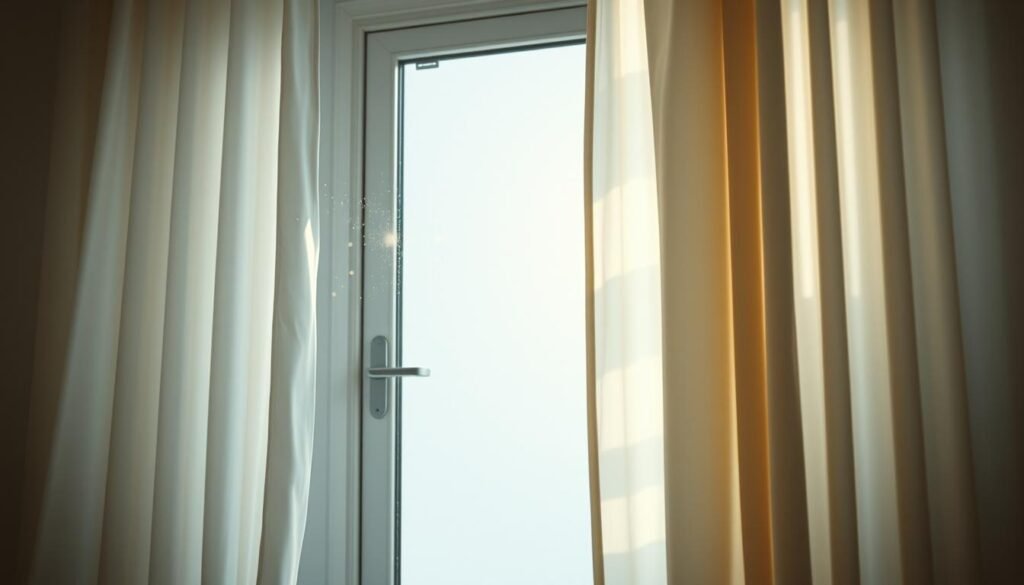
Fixing airflow problems can make your home more comfortable. By managing drafts and airflow, you can reduce door slamming. Regular upkeep and understanding airflow can make your home a nicer place to live.
Using Felt Pads and Foam Strips to Cushion the Slam
Using felt pads and foam strips is a smart and affordable way to stop doors from slamming. These items absorb the sound when a door closes. They make your home quieter and more comfortable.
Felt pads can be stuck to the door or the frame. This makes the door close softly, reducing the noise. Foam strips add more cushioning, making the sound even quieter. These door cushions not only make your home quieter but also help your door and frame last longer.
- Felt pads are great for stopping doors from slamming too hard.
- Foam strips help dampen sound, making your home more comfortable and quiet.
- These simple changes are perfect for older or worn-out doors that tend to slam.
Adding felt pads and foam strips to your home is part of a bigger plan to stop door slamming. Along with other fixes, like adjusting hinges and using door stops, these materials are key. They help make your home a peaceful and welcoming place without costing a lot.
Tightening and Adjusting Door Hinges
Keeping glass doors working right is key to avoiding slamming. Often, the problem lies in the hinges. If they get loose or misaligned, your door won’t close right. Make sure to check your door hinges regularly as part of home maintenance.
To fix loose hinges, use a screwdriver to tighten any loose screws. Be careful not to strip the screws. Proper hinge adjustment makes your door work better and keeps it from slamming. This makes your home quieter.
If problems keep coming back, you might need to do more. This could mean adjusting the hinges or replacing them if they’re old. Fixing these small issues early helps your door last longer and work better. It makes your home more comfortable for everyone.
FAQ
What are common causes of glass door slamming?
How can I identify if my glass door is misaligned?
What maintenance can I perform to prevent door slamming?
Can external weather conditions cause my door to slam?
What DIY solutions can help reduce the noise from slamming doors?
How can airflow and drafts lead to door slamming?
When should I consider repairing or replacing my glass door?
What is the importance of door alignment?
How can I know if my hinges need maintenance?
Source Links
- https://www.greenmatch.co.uk/blog/stop-door-slamming-shut
- https://www.hiatt-hardware.com/blog/post/how-to-stop-a-door-from-slamming
- https://www.clerawindows.com/blog/stop-door-from-slamming
- https://www.constructionspecifier.com/spontaneous-glass-breakage-why-it-happens-and-what-to-do-about-it/
- https://murrayglass.com/what-causes-glass-to-shatter-by-itself/
- https://info.glass.com/what-causes-glass-shower-doors-to-explode/
- https://www.thespruce.com/how-to-fix-a-misaligned-door-5092991
- https://www.bobvila.com/articles/door-wont-latch/
- https://localsgengineering.com/door-hinge-repair/
- https://watersonusa.com/solutions/removable-pin-hinges
- https://www.bobvila.com/articles/doors-slamming/
- https://colnevalleywindows.co.uk/how-to-stop-doors-from-slamming/
- https://www.valuedoors.co.uk/advice/stop-door-slamming/
- https://watersonusa.com/solutions/weighted-door-closer
- https://www.apeer.co.uk/blog/common-composite-door-problems/
- https://rwdi.com/en_ca/insights/thought-leadership/avoiding-the-stigma-of-stack-effect/
- https://octopusdoors.com.au/why-wall-shakes-when-door-closes/
- https://www.aspire-doors.co.uk/external-doors/external-front-doors/advice/9-ways-to-keep-your-front-or-patio-door-from-slamming
- https://www.emeralddoors.co.uk/blogs/news/how-to-stop-doors-slamming?srsltid=AfmBOorDKdh_GmyOCgF0yKAxCSy__wCRH9x8XBeo2dWlp6x-LGDOgPwR
- https://www.windowo.com/blog/door-closer-adjustment
- https://laforceinc.com/blog/how-to-adjust-a-standard-door-closer-in-6-steps/

